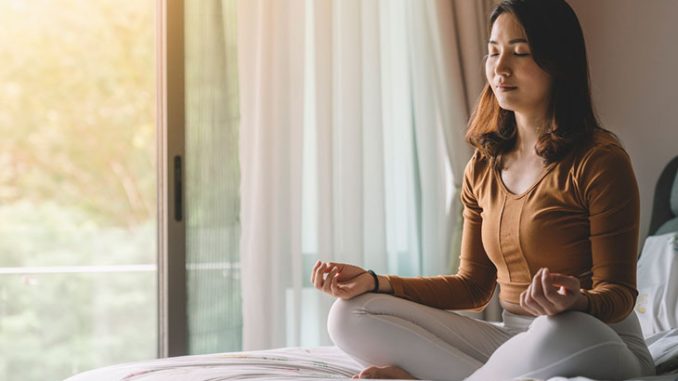
In today’s ultra-fast-paced world, stress and anxiety confront many people. Mindfulness and meditation are strong tools for single people or individuals seeking an effective way to improve their mental state of being.Besides soothing the spirit, these activities also achieve significant improvements in mental health. However, upon further examination, we will see whether this can really bring about long-term changes – changes that keep going after even one single session spent in a room of absolute tranquillity and with not a single distraction. Such a self-expression would occur strictly from feeling it, without the benefit of any sort of context or meaning.
Mindfulness Visualization and Centering
Mindfulness means to be present in the moment, without judgement and completely embracing, non thinking—fully connected with everything that is happening around us as well as with our own thoughts and feelings. It encourages people to approach their experiences of an attitude curiosity and reception.
Meditation on the other hand is a much more varied practice that usually includes mindfulness but can also contain diverse methods such as: focused breathing, visualization and the repetition of a word or phrase. Both practices have deep historical roots in old cultures but became popular during the present operator wave of contemporary times when they were adopted by psychotherapy and other medical technology behind a roomful fire program
Benefits of Mindfulness and Meditation for Mental Health
Decreasing Stress and Anxiety
One of the great benefits of mindfulness and meditation is that they reduce stress and anxiety. Research has shown that frequent practice produces a decrease in levels of cortisol which is the hormone associated with being tense. Mindfulness helps people to recognize what in themselves triggers stress, respond to it calmly rather than impulsively.
Make your content rephrasing more human-like
Enhanced emotional regulation
Mindfulness practices can help people to see things more in perspective. By realizing how similar their own physical sensations are to the symptoms of stress, for instance, individuals come better equipped with all sorts of new tools. These are exactly the kind that are needed for emotional control and peace of mind which we sometimes long for when it seems we can never have them at all. This leads to not only an increase in emotional regulation, but also lowers chances of the switch flipping that causes mood swings and emotional outbursts.
Increased focus and concentration
Mindfulness training sees people gaining in the ability to concentrate, as indeed sitting still and paying close attention to your breath for some time already does this. So this improved focus is not only in this way superficial but also makes a big difference for professional and academic uses of concentration at work or play.
Productivity
Mindfulness training enables resilience to be cultivated. It allows workshop participants to look at difficulties from a balanced viewpoint, one that reduces their feelings of powerlessness. This kind of resilience is important for mental health, because it allows people to hang in there when things get tough and maintain an optimistic attitude.
Closer to Yourself and I [Illegible]
Mindfulness sets up self-awareness. By getting us to reflect on how we think and behave, it equips people with the awareness of themselves. This kind is the basis from which all other possible mental health achievements can start; by introducing into oneself such values as respect or esteem.
Better Sleep Quality
Revised comments
Nowadays, many people are troubled with the problem of not being able to rest peacefully at night – it’s hard to sleep through their own stress and grappling with this anxiety. Mindfulness meditation can still the mind and put an end to wandering thoughts, which increases the chances of one’s quality sleep. Increased sleep in itself is already a part of good mental health, because you let the brain recuperate and stop grabbing for peace.practical Tips For Embedding Mindfulness and Meditation
Guided training sessions now
Small Steps: A few minutes of meditation or mindfulness practice each day will get you used to it. Gradually increase the time period as both skill and habit become established.
Establishing a Habit: Make mindfulness part of your everyday activities. Even during scrappy meals, in the midst of a long walk or while waiting for the train, carve out some time for meditation. zi wei Concept called latsampa use even made itsappearanceon TV, exerted a prop of sorts between mind and natural Reality
Apps and Websites Offer Courses: These training exercises–some with guidance included–give beginners a proper point of departure so that they can begin to meditate successfully.
Your Intentions ought Never to be Dishonest ?
That Christmas Dong Pei Backthen was Rather onEdge. Asformindfulnesstrainingcan confirmaussense all are tools in our
Be Patient: Mindfulness and meditation, like learning anything new, takes practice. Take your time as you build.
Conclusion
Mindfulness and meditation provide invaluable tools for improving one’s mental health. As people are able to fit healthy amounts of relaxation into their busy lives,rationality, emotional resilience grows up and from there on is organized harmoniously with Nature–make disharmony for its own sake, which is antithetical to classic human nature, look less natural. More and more people are experiencing new vitality in the old practice of meditation mindfulness. It is thus that they are regarded as essential parts for overall health. The same point could be made with respect to mental health practices. Adopting these practices is not only a boon for one’s mental health and well being; it can also be a means of deepening the consciousness of self and all other beings.